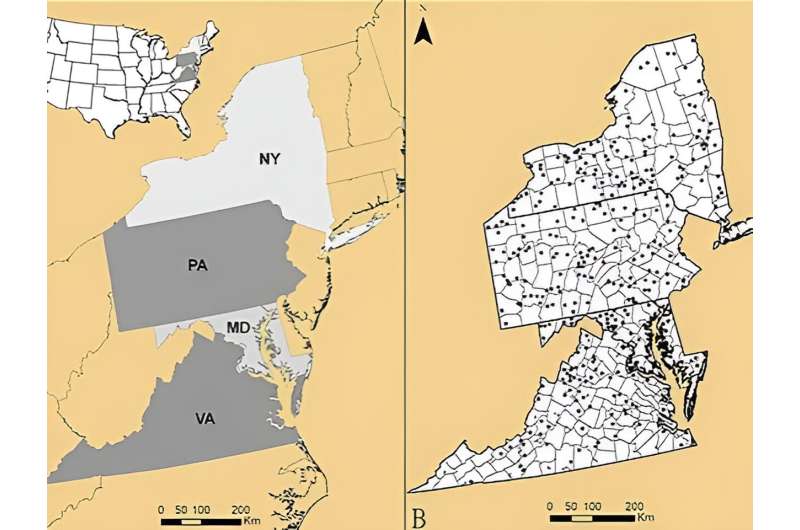This article has been reviewed according to Science X's editorial process and policies. Editors have highlighted the following attributes while ensuring the content's credibility:
fact-checked
trusted source
proofread
Study indicates Pennsylvania private forest landowners value fire as tool to manage woodlands

Fire can help shape ecosystems, and after a century of suppressing naturally occurring fire that has thrown forests out balance, some states—including Pennsylvania—are using controlled burns to help manage forests on public lands. Now, a new four-state study by a team of Penn State researchers shows that many private landowners in the Keystone State value controlled burns and are willing to pay for them on their woodlands, too.
In findings published in Fire Ecology, the researchers reported that many private forest landowners have limited knowledge and experience with burning overall, but many also perceive fire as a low-risk tool and are trusting of professionals who oversee controlled burns.
Of the 482 forest landowners who completed the researchers' survey, nearly two thirds expressed interest in a variety of prescribed fire programs to help achieve management outcomes, including protecting forest health, controlling invasive species and improving wildlife habitat.
"However, Pennsylvania private forest landowners indicated that they are willing to pay more to use prescribed fire on their properties than those in the other states we surveyed," said team leader Melissa Kreye, assistant professor of forest resources management in the College of Agricultural Sciences.
"Pennsylvania landowners were unique within our study area in that they placed the highest economic value on prescribed fire, despite having limited knowledge and experience."
Their interest is not surprising because the science is clear, according to the Nature Conservancy. Controlled burns are a proven way to restore forests. By managing the natural process of fire on the landscape instead of preventing it, landowners can improve habitats for native plants and animals and reduce the risk of out-of-control wildfires.
In 2009, the Pennsylvania Legislature passed the Prescribed Burning Practices Act, which recognizes the value of prescribed burning and protects those who implement prescribed fire when following certain standards. Since then, the Pennsylvania Game Commission and the Pennsylvania Department of Conservation and Natural Resources have expanded their use of prescribed fire as a management tool.
Despite its widely known benefits, prescribed fire is rarely used on private lands in Pennsylvania. Out of the 14,093 acres burned in 2019, only 340 acres were on private lands. This discrepancy is surprising when considering that 70% of the almost 17 million acres of forests in Pennsylvania are privately owned, noted the study's first author Arun Regmi, postdoctoral researcher in the Department of Ecosystem Science and Management.
In a separate article that introduces private landowners in Pennsylvania to the benefits of prescribed fire—"Prescribed Fire: Does It Have a Place on My Land?"—Regmi offered a rundown of state laws about prescribed fire, the cost of burning and some of the risks and rewards associated with prescribed fire.
In the study, the researchers surveyed private forest landowners in four states: Maryland, New York, Pennsylvania and Virginia. The survey contained 68 questions and consisted of four sections: questions about land ownership and management objectives; questions to measure knowledge, perceived risk and trust; questions about desired controlled fire treatments and scenarios; and landowner demographic questions.
Based on interviews they conducted with prescribed burn service providers, the researchers reported that the price of controlled burning can be highly variable across and within states. Prices ranged from $20 to $400 an acre and depended on various factors such as burn acreage and resource availability. These values informed the prices included in the study and presented to private landowners.
Lower burning costs played a major role in private landowners' desire to try prescribed fire, Kreye pointed out; however, considerations such as coordination with state agencies, cost-share assistance and access to consultants also positively influenced their views.
Spatial analysis of survey responses revealed a north-south gradient in landowner opinions about controlled burning across the Mid-Atlantic Region, Kreye said, with opinions about the practice more positive in Virginia, the southern-most state in the study. That outcome results from the varied histories of prescribed fire use and laws in the surveyed states, she suggested.
"In Virginia, controlled burning by private landowners as a forest management tool is already well established and has been occurring for 100 years, and they have qualified professionals in place to accommodate the practice," she said. "In New York, where controlled burning has not been part of the culture, the desire seems to be lacking to use fire on private lands, and the state's laws are not supportive."
In Pennsylvania, it's a different story, Kreye explained, likely due to the increased use of prescribed fire by the state's Game Commission and Department of Conservation and Natural Resources Department of Forestry on public lands in the last decade. And those agencies have widely extolled the ecological benefits of controlled fire on the landscape, Kreye said.
That publicity has influenced private forest landowners, Kreye said, and is likely responsible for changing land manager and landowner views about the benefits of prescribed fire.
"Pennsylvania is transitioning away from a fire-exclusion state to one that wants to live with fire, largely driven by a change in cultural values related to the benefits of prescribed fire," she said.
"But for real change to occur, a workforce and economic base is needed to support controlled burning. Right now, that is insufficient. But the good news is that a public-private organization called the Pennsylvania Prescribed Fire Council has recently launched a training program for people to become certified to burn on private lands."
More information: Arun Regmi et al, Forest landowner values and perspectives of prescribed fire in the Northeast/Mid-Atlantic region of the United States, Fire Ecology (2024). DOI: 10.1186/s42408-024-00258-y
Provided by Pennsylvania State University




















